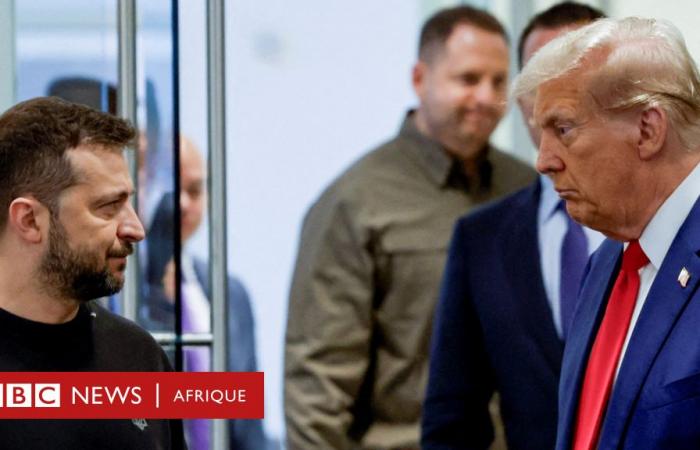Photo credit, BBC/Joe Phua
- Author, Paul Adams
- Role, Diplomatic correspondent in Dnipro, Ukraine
-
4 hours ago
As the Russian army slowly advances into eastern Ukraine, it brings with it a tide of human suffering.
Two months before the change of administration in Washington, Ukraine faces two problems: how to stem the advance and how to prepare to confront Donald Trump.
At a shelter in Pavlohrad, about 100 km west of the slow-moving front line, evacuees are constantly arriving from war-affected villages and towns.
Anastasiia Bolvihina, 31, is there with her two boys, Arseniy and Rostyslav. The family cat sleeps among the few belongings they managed to bring back from the village of Uspenivka, just outside the besieged town of Pokrovsk.
The family held on to their home as long as they could, but with explosions all around, shops closed and roads cut off one by one, they finally gave in to the inevitable. Anastasiia Bolvihina and her children packed some things, locked the door and left.
“We hoped that the war would overtake us and end soon,” Anastasiia told me.
Today, after two months without electricity or internet, she has her laptop open on the bed and catches up on the news.
“We hope that things will get better and that the war will end. I hope that the new president will be better than the current one,” she responds when I ask her about the political changes in the United States.
In an adjacent auditorium, dimly lit and warmed by a single bar heater, elderly evacuees are cared for by volunteers.
It is a theater of misery, with motionless, exhausted figures sitting or lying on cots, some seemingly lost in thought.
Kateryna Klymko, 83, from Sukhi Yaly near Kurakhove – another town slowly overrun by Russians – has just arrived.
She sobs briefly as she describes how her house burned, along with all her belongings.
“They bombed so much. It’s like the last judgment!” she says of the advancing Russian army.
Could Ukraine still win, I asked him?
“God only knows,” she sighs. “My heart sinks at what I hear. We have been bombed so many times and so many people have died.”
Russia also launched a massive ballistic missile strike on Dnipro overnight. It was felt all over the city and it sent everyone, including the BBC crew, into bomb shelters.
The Biden administration’s latest decisions regarding ATACMS (long-range missiles) and landmines are clearly designed to help Ukraine retain territory, both its own and in Russia’s Kursk region.
Both could feature in negotiations next year, if that is the path Donald Trump intends to follow.
So far, the president-elect of the United States has given very few clues about how he plans to end the conflict, beyond a typically vainglorious promise to end the war in twenty-four hours. .
Ukrainian politicians, from President Zelensky on down, seem eager to give Trump the benefit of the doubt.
“I think he took a very intelligent approach,” former Foreign Minister Dmytro Kuleba told me, “by clearly defining the goal – ‘I’m going to fix it’ – but without going into detail.”
Despite Trump’s reputation as a zero-sum businessman with a curious admiration for Vladimir Putin, Dmytro Kuleba says people tend to oversimplify him.
“He may have a bigger picture in mind, and I’m sure it won’t just be transactional.”
As the new administration takes hold and minds begin to turn to how to realize Trump’s ambition, the former foreign minister believes one overriding factor will guide policy.
“President Trump will undoubtedly be guided by one goal: to project his strength, his leadership,” he said. “And to show that he is capable of solving the problems that his predecessor could not solve.”
Projecting strength, according to Kuleba, will mean relying on both sides.
Walking away from Ukraine, he says, is not an option.
Photo credit, Reuters
“As much as the fall of Afghanistan has inflicted serious injury on the Biden administration’s foreign policy reputation, if the scenario you mentioned were to be considered by President Trump, Ukraine would become his Afghanistan, with equivalent consequences. And I don’t think that’s what he’s looking for.”
Last weekend, President Zelensky said Kyiv would like to end the war through “diplomatic means” in 2025.
The war, he said, would end “sooner” with Trump in the White House.
It was classic Zelensky: part flattery, part defiance.
Among those who paid the heaviest price for Russia’s invasion, peace cannot come soon enough, even if it means further sacrifice.
In Dnipro, a steady stream of wounded soldiers comes through the doors of one of the country’s many prosthetic centers.
Demian Dudlya, 27, lost a leg when his unit was attacked by missiles eighteen months ago.
He is already accustomed to his carbon fiber limb and is even training for the upcoming Invictus Games. But when it comes to the war, he is less optimistic.
“I think that, most likely, two regions (Donetsk and Luhansk) will be taken from us, as well as Crimea,” he said. “I am not sure that we will push them out of these regions. We have neither men nor weapons .”
Photo credit, BBC/Joe Phua
Opinion polls paint a mixed picture but show that more and more Ukrainians want this war to end soon. Especially here in the East, where sirens sound several times a day.
A growing minority says it is willing to cede territory to ensure peace.
“I think the end of the war will come,” says Andrii Petrenko, 28, when I ask him what he expects when Donald Trump takes office.
Andrii is having his first prosthesis fitted, after losing a leg three months ago.
“Either they will accept and return to the 1991 borders, or the territories will be abandoned. The main thing is that the war ends and people stop dying.”






